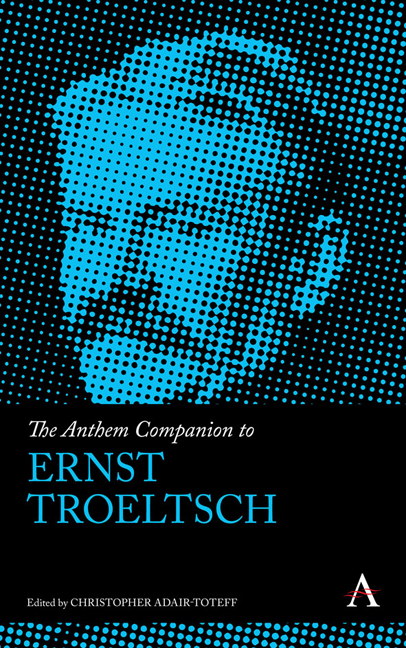Book contents
- Frontmatter
- Contents
- Introduction Ernst Troeltsch: Theologian, Sociologist, Philosopher, and Culture Critic
- Chapter One The Independence of Religious Phenomena: The Work of Ernst Troeltsch as a Template for the Study of Religion
- Chapter Two Troeltsch on Protestantism and Modernity
- Chapter Three Church, Sect, Mysticism: Writing the History of Christianity
- Chapter Four Troeltsch's Personalism
- Chapter Five Performative Practice: Ernst Troeltsch's Concept(s) of Christianity
- Chapter Six Troeltsch and the Problem of Theological Normativity
- Chapter Seven Troeltsch as Dogmatic Theologian
- Chapter Eight Ernst Troeltsch and the Problem of Historicism
- List of Contributors
- Index
Chapter One - The Independence of Religious Phenomena: The Work of Ernst Troeltsch as a Template for the Study of Religion
Published online by Cambridge University Press: 10 May 2018
- Frontmatter
- Contents
- Introduction Ernst Troeltsch: Theologian, Sociologist, Philosopher, and Culture Critic
- Chapter One The Independence of Religious Phenomena: The Work of Ernst Troeltsch as a Template for the Study of Religion
- Chapter Two Troeltsch on Protestantism and Modernity
- Chapter Three Church, Sect, Mysticism: Writing the History of Christianity
- Chapter Four Troeltsch's Personalism
- Chapter Five Performative Practice: Ernst Troeltsch's Concept(s) of Christianity
- Chapter Six Troeltsch and the Problem of Theological Normativity
- Chapter Seven Troeltsch as Dogmatic Theologian
- Chapter Eight Ernst Troeltsch and the Problem of Historicism
- List of Contributors
- Index
Summary
In a world increasingly beset by virulent religio- political controversies, casting an eye over past debates might be one way of injecting some objectivity into this discourse. Various thinkers have taken us down certain unproductive paths several times over, while some of the more astute past interpreters of religion warned of the dangers of a reductive view of religious phenomena – and underlined the independence of religion – with greater nuance and insight than many present- day authors. It seems to me that few past thinkers have as much to offer us in these respects as Protestant theologian, historian of Christianity, sociologist of religion and cultural philosopher Ernst Troeltsch. I intend to bring this out through a meditation on just one of his texts (‘Die Selbständigkeit der Religion’, or ‘The Independence of Religion’).
Troeltsch did not include this essay, originally published in 1895/ 96 in the Zeitschrift für Theologie und Kirche, in the four- volume selection of his collected writings (Gesammelte Schriften), nor was it reprinted anywhere else until the publication of the corresponding volume of the Kritische Gesamtausgabe in 2009. As a result, over the last few decades and within the international debate this text has received even less attention than the other writings of this major thinker. No English translation has so far appeared. And his essay does not make things easy for the reader, particularly a present- day one. If we apply the standards that increasingly hold sway today and that go a long way towards determining the career prospects of up- and- coming scholars through the process of publication ‘in refereed journals’, we soon realize that Troeltsch flagrantly violated every one of them. What present- day journal would accept a 165- page essay entirely devoid of subheadings and of any sort of easily graspable structure, a text whose long and complex sentences interleave the examination of factual issues with critical commentary on numerous thinkers of past and present? At best the editors would surely respond with ‘revise and resubmit’. Troeltsch himself later described his early texts as ‘studies born of struggle and toil’, ‘a patchwork that betrays it's cobbledtogether’.
- Type
- Chapter
- Information
- The Anthem Companion to Ernst Troeltsch , pp. 25 - 36Publisher: Anthem PressPrint publication year: 2017



